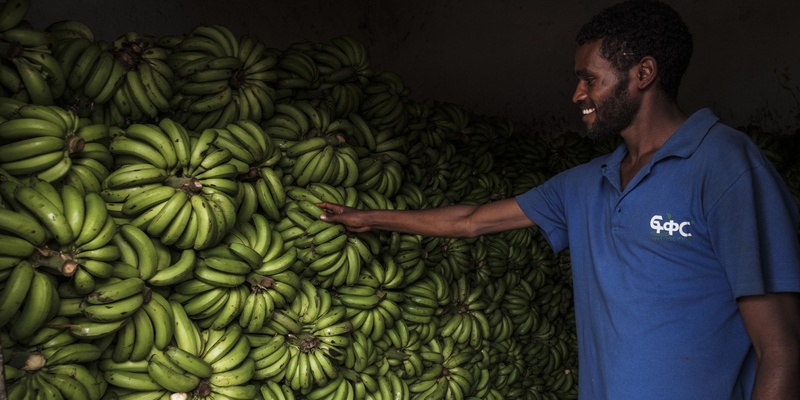CPM-18 delegates share country experiences in preventing the introduction and spread of banana Fusarium wilt disease
Posted on Wed, 17 Apr 2024, 16:34

©FAO/Eduardo Soteras
Rome, 17 April 2024. Plant health stakeholders, including representatives from National Plant Protection Organizations (NPPOs), the private sector, and academia attending the 18th Session of the Commission on Phytosanitary Measures (CPM-18), participated in a side session to share lessons on the importance of early-warning systems, containment and simulation exercises of Fusarium oxysporum f.sp. cubense Tropical Race 4 (TR4).
The session emphasised the need for global cooperation against Fusarium TR4, an aggressive and tiny fungus that threatens to wipe out bananas if not stopped in its tracks. The fungus spreads through infected plants and contaminated soil particles attached to items such as farm tools, shoes, animals, and vehicles. It attacks the roots of the banana plant, clogs its vascular system through which the plants receive water and minerals, eventually causing Banana Fusarium Wilt disease. The most effective method of combatting TR4 is to prevent its introduction and spread to unaffected areas and to contain it upon detection.
“The IPPC is committed to supporting the global plant health community to prevent the spread of plant pests such as fusarium wilt disease, particularly to major economically important, staple food crops like bananas. We need strong collaboration among countries because no single country can tackle this challenge in isolation, and that entails public-private partnership and mobilization of resources”, said Osama El-Lissy, IPPC Secretary.
Raixa Llauger from FAO Mesoamerica and Carlos Ramón Urías Morales from Organismo Internacional Regional de Sanidad Agropecuaria (OIRSA) made a technical presentation on the regional capacity development efforts in Central America, supported by FAO and OIRSA. Their interventions to tackle the pest included offering an e-learning course on TR4 management, establishing a TR4 community of practice, using artificial intelligence for TR4 simulations and emphasizing risk communication.
Country experiences
The side session gave NPPOs from different countries a platform to share their experiences in responding to Fusarium TR4 outbreaks and conducting preparatory simulation exercises against Fusarium TR4 outbreaks.
Afonso Sitole and Antonia Vaz presented Mozambique’s experience in containing Fusarium TR4. When TR4 was first reported in Mozambique in 2013, the country took swift action to save the banana crop which earns Mozambique about USD 70 million annually in exports. Through regular monitoring, using an emergency action plan, and working through a task force, Mozambique was able to contain the pest. A TR4 tolerant banana variety called Formosana was promoted, and farmers were encouraged to adopt good practices such as disinfecting footwear, vehicles and tools. Mozambique emphasized the value of involving local communities and mass awareness campaigns.
Dr Gabrielle Vivian-Smith, Australian Chief Plant Protection Officer, shared Australia’s emergency response and management experience to Fusarium TR4- first detected in Australia in 1997. She noted that the Australian industry is “motivated and cohesive” in addressing TR4, and the country has well established biosecurity systems and legislation, which promotes early reporting and containment.
Joan Jose Montilla, Director of the National Institute of Integral Agricultural Health highlighted Venezuela’s proactive response measures against Fusarium TR4. Venezuela formed a scientific advisory committee and regional commissions, updated its legislation, and trained plant health officers, with technical assistance from FAO, through a FAO emergency fund.
Nicaragua prioritized strengthening response capacity to Fusarium TR4. Engineer Ricardo Somarriba Reyes, Executive Director of Instituto de Protección y Sanidad Agropecuaria shared Nicaragua’s experience in TR4 response simulation exercise at airports, land border entry points, and on a banana farm. Simulations involved the use of canines, inspection of travelers’ bags, aspersion treatment, and laboratory simulation using a mobile diagnosis unit for on-the-spot testing of Fusarium TR4 and other pathogens.
Ecuador’s TR4 prevention strategy, as presented by Engineer Larry Rivera from the Phytosanitary and Animal Regulation and Control Agency, aimed to increase knowledge, facilitate better emergency response, and develop and evaluate NPPO plans, equipment, and skills. The implementation of field simulation exercises, a risk communication plan, training in biosafety and updating of TR4 regulations were critical actions. Ecuador is currently developing its TR4 operational documents into infographics to ensure clear and effective communication on Fusarium TR4. Development of a national operational group dedicated to managing TR4 outbreaks is underway.
Ramiliarijaona Nomenjanahary Saholy from the NPPO of Madagascar noted that although Fusarium TR4 has not been detected in Madagascar, largely because the country does not import banana germplasms, Madagascar is alert to the threat. Madagascar took part in a Fusarium TR4 tabletop simulation exercise organized by the IPPC Secretariat, which strengthened the NPPO’s capacity to inspect passengers’ luggage at the airport and carry out awareness-training activities among customs agents. Madagascar has also trained plant protection technicians, health and phytosanitary inspectors in emergency response to Fusarium TR4 following that tabletop simulation exercise.
Related information

